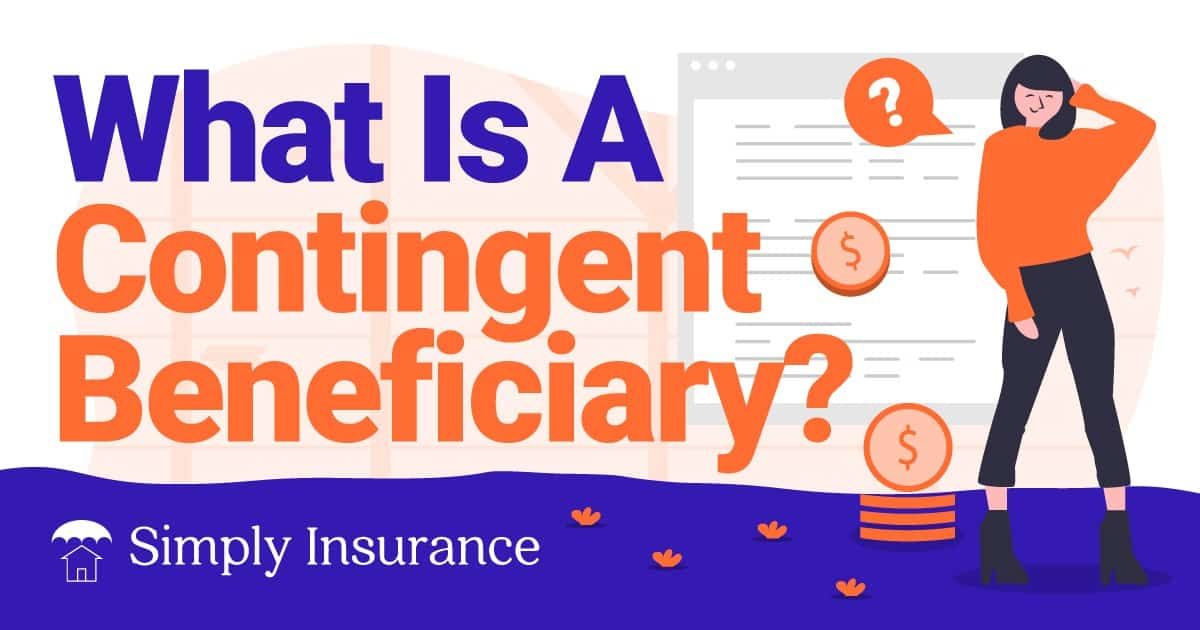Getting a life insurance policy can often be overwhelming and insurance jargon can be difficult to follow.
One of the most important decisions you need to make when setting up your policy, however, is who your beneficiary will be.

But what is a beneficiary? Can you choose more than one? Are there any rules you need to follow?
I pride myself on making the insurance process easy and speaking in “Plain English,” so stick with me. I’ll define what a beneficiary is, how it differs from a contingent beneficiary, and help you avoid the most common mistakes people make when designating their beneficiaries.
What Is A Beneficiary?
A beneficiary is a person or organization that will receive a distribution of money or assets upon your death.
Your beneficiary doesn’t need to be a relative, spouse, or your minor child—they can be a friend, a business partner, or even the person that cuts your hair.
You can also designate an entity as your beneficiary, such as a non-profit organization or your favorite charity.
Your beneficiary can even be your estate or the trustee of a trust that you have established.
While designating a beneficiary is your choice, some states regulate who you can and can’t name.
Make sure you speak with your insurance company directly or a life insurance agent to ensure that your beneficiary has insurable interest.
The point of life insurance is to make things easier on your loved ones after your death—following your local laws will ensure the distribution of your assets goes smoothly.
There are two different types of beneficiaries: a primary beneficiary and a contingent, or secondary, beneficiary.
What Is A Primary Beneficiary?
A primary beneficiary is the person, persons, or entity(s) that will receive a payout from your life insurance policy.
For some, designating more than one beneficiary makes sense. Your spouse and your sibling, for example, or your business partner and favorite charity.
However, in my experience, most people choose a single primary beneficiary.
What is a Contingent (Secondary) Beneficiary?
A contingent beneficiary is a person or entity that will get your insurance payout if your primary beneficiary is deceased, unable to, or refuses the distribution.
They are, for all intents and purposes, your “backup” beneficiary.
Just like with a primary beneficiary you also have the option to have more than one contingent beneficiary.
Contingent Beneficiary vs. Primary Beneficiary
You can name multiple primary beneficiaries and multiple contingent beneficiaries in your life insurance policy. Most insurance companies will allow you to put up to ten beneficiaries of each type.
For example, you might designate your spouse or partner as the primary beneficiary of a life insurance policy, and your local humane society as your secondary beneficiary.
The humane society will only receive a payout distribution if your spouse is unavailable or unable to accept the policy benefits— basically if you and your beneficiary die at the same time, the humane society would get the payout.
The same person can’t be both a primary and a contingent beneficiary.
Why Should I Designate A Contingent Beneficiary?
Designating a secondary beneficiary protects your loved ones from a messy financial situation after your death if the primary beneficiary can’t or won’t accept the distribution of your life insurance.
In most instances, beneficiaries are given precedence over wills by the law.
If there is no contingent beneficiary on your policy, your death benefit proceeds may become tied up in your estate, making them subject to estate taxes, probate, or creditors.
If that occurs, it can make it difficult for your loved ones to gain access to your insurance payout at all, let alone in a timely manner.
Think of your contingent beneficiaries as a safety net that ensures your death benefit goes where you want.
THE SIMPLY INSURANCE WAY
Life Insurance made easy.
Agents not required.
Get quotes and sign up online without talking to an agent. But, we are here if you need us.
Unbiased, expert advice.
Get unbiased insurance education from licensed experts and also avoid dodgy sales calls.
Coverage in minutes.
You can get life insurance coverage within minutes of getting your quotes and applying.
How Do I Choose A Contingent Beneficiary?
If you’ve already chosen your primary beneficiary, you’re already familiar with the process.
Choosing your contingent beneficiary involves essentially the same steps. Remember to consider the people that depend on you financially.
Is there anyone else other than your primary beneficiary? Are you helping your parents with money? Do you belong to any clubs or organizations? Is there a group or charity that you support that you would like to continue supporting after your death?
Any of these choices would make good secondary beneficiaries.
Can I Change My Beneficiary?
Yes. As long as you are the owner of the policy you can change your beneficiary or beneficiaries as much or as often as you like.
It’s as easy as contacting your insurance agency, agent or company and requesting a change of beneficiary form. They’re easy to fill out and return.
Now, there are some instance where you won't be able to change your beneficiary and that is if the owner of the policy makes them irrevocable.
What's An Irrevocable Beneficiary?
An irrevocable beneficiary is someone who was designated at the beginning of the policy as your primary beneficiary and who can never be removed from the policy as the beneficiary.
Usually this type of designation is used for special situations such as making sure that you remain the beneficiary on your spouses policy.
The bottom line is that if you make someone an irrevocable beneficiary, there is no going back on that decision.
What's A Common Mistake People Make When Picking Their Contingent Beneficiaries?
People want to provide for those they love. Most often, couples without children designate their spouse or partner as the primary beneficiary, while parents name their children—and that’s one of the most common sources of error.
When choosing a contingent beneficiary, having minor children as designees can create problems if not done correctly.
If you want your children, or a child with special needs, as your contingency beneficiary, take the time to designate a guardian or trustee to manage the death benefit payout.
If you fail to do so, the court will appoint a guardian to handle the proceeds, which can be a costly and time-consuming process which makes things even harder for your family
Setting up a trust is something you probably should do with an attorney.

How Often Should I Review My Beneficiaries?
You should review your beneficiaries after any significant life event that may affected who you want to receive your death benefits.
Things like you getting a divorce, having or adopting a child, becoming involved in a charitable organization, or getting married, are all good occasions to review your life insurance policy.
If you follow the above rules you should be all set in the beneficiary department.
INSURANCE WHERE YOU LIVE
Life insurance by state.
">Taking Action
We all know that getting life insurance is a crucial step toward protecting our loved ones and providing for them after our death.
Now that you understand the importance of the contingent beneficiary you should be more equipped when buying your policy.
The process doesn’t have to be complicated or costly, and it doesn’t have to take hours. You can get immediate quotes and coverage by clicking here or any of the above buttons.
